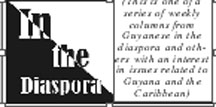By Linden Lewis
Linden Lewis is a Professor of Sociology at Bucknell University in Pennsylvania, USA.
The recent launch of the Men’s Affairs Bureau [MAB] has stimulated an interesting national discussion about the role and status of men in Guyanese society. Though I believe most people would welcome this idea of providing institutional support for men in challenging and changing circumstances, there were some remarks made at the launch of MAB at the Umana ana, which would appear to raise some concerns, and to cause others to feel ill at ease.
Historically, men have felt in charge of their own destinies, and are usually reluctant to ask for help. Part of the machismo of the region is that men are to show no signs of vulnerability hence, they have to be seriously ill even to see a doctor let alone admitting that one may have a serious enough problem to have recourse to a therapist. To the extent that MAB could provide an appropriate forum, equipped with trained counselors who could dispense rofessional assistance to men, one could only interpret this development as useful.
 Moreover, insofar as this new bureau has among its objectives that of addressing the tensions between men and women, reducing and ultimately eliminating gender-based violence, and promoting a sense of purposefulness among men, the question becomes, why would its announcement generate some degree of anxiety in the society as is evident from some of the concerns expressed in various parts of the media?
Moreover, insofar as this new bureau has among its objectives that of addressing the tensions between men and women, reducing and ultimately eliminating gender-based violence, and promoting a sense of purposefulness among men, the question becomes, why would its announcement generate some degree of anxiety in the society as is evident from some of the concerns expressed in various parts of the media?
First, if even one allows for the specificity of men’s problems in contemporary Guyana, a logical question to ask would be, why is it that men’s problems cannot be addressed under the general rubric of gender affairs, rather than establishing two separate entities – a men’s and women’s bureau – to deal with a series of related problems? Second, some effort should have been made to allay any fears on the part of women, that the development of a men’s bureau might in some way distract attention, or divert resources away from women’s issues and concerns. It would be reasonable for women to begin to wonder, given the traditional domination of men and of things masculine, whether the establishment of a men’s bureau would shift the emphasis away from the problems faced by women and onto the immediate concerns of men and boys. Third, the concern that men are lagging behind women in society, and that girls are outperforming boys at school, begs the question, is it that men need help in coping with the challenges of the present society, or that men need to get back to a stage of dominance over girls and women in most spheres of life? There was no outpouring of concerns when boys were outperforming girls in school, or when women’s advancement seemed blocked by the glass ceiling. It would have been useful therefore from the very outset, for MAB to set the tone of discussion around its intervention by indicating that it was not interested in restoring a gender order that has clearly outlived its usefulness, or is hung up on an antiquated set of values about men’s ordained and unquestioned right of leadership in the society and in the household.
Quite apart from distancing themselves from such backward thinking, regrettably speakers at the launch of MAB seemed to embrace the idea of restoring a particular kind of gender order. One speaker talked about honouring men and giving them their place in society. These are not words of reassurance of gender collaboration. Rather the expression of such an intent is more in sync with the notion of returning men to a place of dominance. Furthermore, the remarks about some unspecified process that leads to effeminacy could only be regarded as ill informed and unhelpful. These remarks are also at odds with the expressed idea of respecting people’s sexual orientation and not persecuting them for the same. The goal then is not necessarily one of finding a community where men can get together to discuss the problems they face in some presumed strong masculine environment. The real task ahead is that of providing a space where the promotion of free and open discussion can take place between men, and between men and women. How can men possibly move forward if they only speak among themselves? MAB could be helpful if it provides a space where older men could mentor younger men about negotiating conflict without resorting to violence, or where the process of gender socialization advocates mutual respect as a crucial part of the relationship between men and women, and where men can be encouraged to take responsibility for equal sharing of responsibility in the household and in the provision of care in the family.
There is no doubt that there are perhaps some good intentions and good will associated with the establishment of the Men’s Affairs Bureau, however if one is to be optimistic about its objectives in the Guyanese society, then one has to conclude that it has not yet found an appropriate vocabulary for articulating its purpose. At some level one has to believe that this is the reason for some of the misstatements at the recent launch of this new government department. If on the other hand, we accept some of these remarks as true and accurate, then this men’s bureau is nothing more than sounding brass and tinkling cymbals, which would indeed be unfortunate in perpetuating a problem it was intended to resolve. Let us hope then that the thinking behind this men’s bureau becomes clearer, and that its language of outreach becomes more precise.
